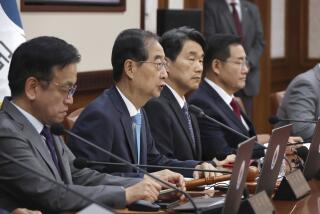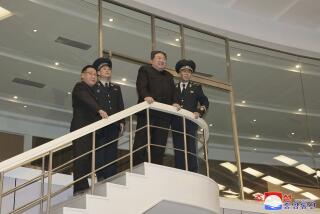N. Korea Bows to Nuclear Inspection Pressure : Diplomacy: It tells international agency it will sign accord, easing U.S. concerns over its arms pledge.
- Share via
OSAKA, Japan — North Korea confirmed today that it will permit inspection of its nuclear facilities, easing U.S. apprehensions that Pyongyang might not honor its pledge to abandon aspirations to produce nuclear weapons.
In a announcement relayed by its official news agency, North Korea’s Foreign Ministry said it will sign an accord with the Vienna-based International Atomic Energy Agency and have it ratified by Jan. 30.
The statement was greeted with cautious encouragement here by U.S. officials traveling with President Bush, who said they now expect North Korea to accept a U.S. offer of improved relations and an invitation to a meeting in New York.
In Seoul, the South Korean Defense Ministry formally announced that its joint military exercises with the United States scheduled for next month will be canceled, now that North Korea has agreed to sign the IAEA agreement.
Bush, in a visit to Seoul on Monday, had offered to put off the “Team Spirit” exercises on condition that Pyongyang fulfill its promise--first made in an accord with South Korea last week--to open its doors to international inspectors.
In the North Korean statement, monitored by news services here, a Foreign Ministry spokesman said that in signing the accord, Pyongyang will “make an active contribution to the cause of completely eliminating nuclear weapons from the globe and defending peace and security in Asia and the rest of the world.”
The declaration was given added authenticity by the Vienna-based IAEA, which said Pyongyang has notified the agency that it would sign this month a United Nations safeguard to permit the nuclear inspection.
The accord will provide inspectors access to secret nuclear facilities in North Korea that the United States believed could have been capable of producing nuclear weapons within two years.
The announcement in Pyongyang came only hours after Bush left South Korea, where he offered to improve relations with North Korea if its government opened its facilities to inspection.
Bush, who began his trip to Asia saying his top priority was to help create American jobs, arrived in Japan today insisting it would not be fair to hold him to a particular standard of success.
The step marked the bluntest effort yet by Bush to scale back expectations swollen by pre-trip White House rhetoric and acknowledge to voters that any tangible benefits from his journey would be slow to take shape.
In a news conference in Seoul on Monday, Bush blamed “political opponents” for demanding too much of his four-nation journey through criticism he compared to “raising the bar on the high jump.”
Bush began his Japan visit in the most non-confrontational of ways with a visit to Kyoto’s Imperial Palace. Clad in a business suit, he joined brightly costumed members of the palace aristocracy in a formal courtyard for an 8th-Century game of kemari , eagerly using feet and head to keep a deerskin-covered ball aloft.
He later met over a private lunch with former Prime Minister Toshiki Kaifu, with whom he has shared a close personal relationship. While he planned later in the day to dedicate a newly opened Toys ‘R’ Us store in Nara, the stop was intended as a positive symbol to promote the opening of Japanese doors to more such U.S. ventures.
It took three years for the company, the world’s largest toy store, to win permission to enter Japan, and it remains the only foreign retail company to have cracked the Japanese market under trade rules that were eased last year. But Toys ‘R’ Us now plans to open seven stores in Japan by the end of 1992.
Indeed, even as Bush prepared for talks Wednesday with Prime Minister Kiichi Miyazawa, he appeared to be moving away from an unsteady platform of economic confrontation to seek refuge in the security matters that have provided him a more solid base.
And as Democrats back home pressed Bush to seek specific concessions by the Japanese, the White House was taking further steps to minimize the danger of negative judgments.
A joint news conference planned for Thursday with Miyazawa was rescheduled to begin at 2:30 a.m. Eastern time--making it impossible for its politically charged contents to be reported in most morning newspapers.
Instead, Bush is to deliver a homecoming address Friday morning after his return to Andrews Air Force Base but not to take questions there.
The steps appeared to be a clear effort to deprive Democrats of political ammunition.
More to Read
Sign up for Essential California
The most important California stories and recommendations in your inbox every morning.
You may occasionally receive promotional content from the Los Angeles Times.













